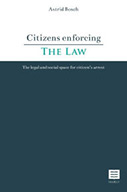Citizens Enforcing the Law: The Legal and Social Space for Citizen’s Arrest

Author: Astrid Bosch
Publisher: Portland: Maklu, 2013. 179 p.
Reviewer: Russ Immarigeon | September 2015
In upstate New York, according to a recent newspaper account (Black, 2014), a small town mayor suggested that citizens could informally help local law enforcement by keeping apparent law-breakers they happen across at bay with a baseball bat until police officers arrive to make a formal arrest. Is this vigilantism, or at least extralegal, or is it legitimate citizen action? In Citizens Enforcing the Law, Argentine attorney Astrid Bosch grapples with a public debate in the Netherlands about “the legal limits for citizen’s engagement in law enforcement” when “ordinary citizens were legally prosecuted and convicted for forms of citizen’s arrest that ordinary citizens appeared to support but the courts considered illegal.”
In this insightful essay, Bosch examines the gap between “state law” and “living law.” In particular, she delves into eigenrichting, a Dutch term for “taking the law into one’s own hands.” Does such citizen action, she asks, help or harm the rule of law?
Bosch’s research comprises legal and socio-legal analysis. For the former, she assesses legal case vignettes, gathered through a LexisNexis search, contact with district court justices, and a review of the National Public Prosecution Service’s website, on norms constraining or enabling citizen law enforcement. For the latter, she interprets the results of self-responses and open-ended questions about four specific vignettes from interviews with 32 Dutch and non-Dutch male and female respondents from a range of social locations and occupations in the cities of Amsterdam and Groningen.
“In actual practice,” Bosch observes, “the legal system operates through a complex interplay of constraining and enabling norms and principles to establish criminal liability. My analysis of state law [in the Netherlands] shows that citizens are legally allowed to effect citizen’s arrest, and even to cause some harm while doing so, as long as they do not harm the suspect with intentions other than stopping an attack or delivering him to the police. Beyond these circumstances, harmful acts carried out in the course of a citizen’s arrest are not allowed and are punishable by law. However, while the legal norms provide in abstractum for the criminalization of harmful actions, their unlawfulness and the criminal liability of the actor can be excluded.”
“In actual practice,” Bosch further observes, “certain principles and jurisprudence guide judges in deciding whether in concrete cases, the exceptions specified by law apply. Exceptions exclude criminal liability when citizens react to an imminent unlawful danger, and in doing so inflict harm that is strictly proportionate and absolutely necessary to that danger. If the actor went beyond those limits nonetheless, he or she could still be excused if they could not be complied with because an emotional or psychological pressure prevented this, or because the person caused harm in the absence of all fault, i.e., the actor took all the required precautions to prevent harm, but the harm was caused nonetheless.”
Overall, Bosch notes “two corrective criteria that constrain justifications and excuses,” namely, “when the person relying on them exposed himself to the danger, or possessed skills that would have permitted him to choose a less harmful alternative than the great harm caused.” In addition, Bosch demonstrates that “the legal space for citizen law enforcement in society is not static. Over time, changes in the interpretation of the legal norms and principles mentioned have gradually expanded. This became particularly evident recently, in cases of self-defense and the improper use of self-defense.”
Furthermore, Bosch finds the arguments common in these vignettes remarkable for their reliance on quasi-legal principles. “Being part of the living law,” as she locates the meaning of these principles, “is not identical to the legal principles that the courts apply. These forms of argumentation, which are to be found in the narratives of ordinary people, make certain alterations to the way legal principles tend to be applied in the official case law and jurisprudence. These arguments thus enlarge the social space for citizen’s arrest and, more generally, for citizen’s participation in the enforcement of law.”
Reference:
Black, Tobiah (2014). “Philmont board wants cop but doesn’t find one.” Columbia Paper, August 15. Available online at http://www.columbiapaper.com/2014/08/philmont-board-wants-cop-doesnt-find-one/.
Russ Immarigeon, local “town and village” court justice, upstate New York


